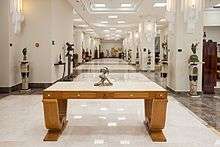Art Deco Museum
The Art Deco Museum is a museum in Moscow, Russia. It is one of the newest museums in the city, opening in 2014.[1]
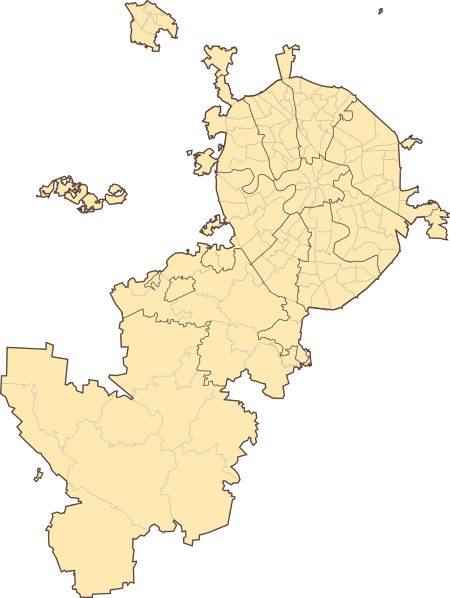 Location within Moscow | |
| Established | 2014 |
|---|---|
| Location | Luzhnetskaya emb. 2/4, build. 4 Moscow, Russia |
| Coordinates | 55°42′56″N 37°34′26″E |
| Curator | Mkrtich O. Okroyan |
| Website | en |
History
The museum was founded by Mkrtich Okroyan after he became an enthusiast of art deco architecture, building up a collection of artefacts worth over $100 million.[1] He founded the Art Deco Russian House at "The Four Seasons" complex in 2005. In 2010, he opened the Art Deco Gallery in Bayer & Co factory on the Luzhnetskaya Quay. The museum joined the International Council of Museums (ICOM) in 2015.
Collections
The museum's objects were collected by Okroyan over 15 years and now represents one of the largest collections of art deco end art nouveau objects in Russia. The collection includes more than 900 sculpture works in bronze and ivory of the 1920s years, more than 300 items of furniture, and as a significant number of objects of decorative and applied arts and graphics.[1]
Sculpture
The core of the collection consists of nearly all the sculptures of Demetre Chiparus, a prominent representative of plastic architecture from the art deco period. A key piece in the collection is his composition Les Girls, representing five dancers on the stage of the music hall. The collection includes a number of works by Bruno Zach, Gerda Iro, Ferdinand Preiss, Paul Philippe, Otto Poertzel, Pierre Le Faguays and Claire Colinet.
Home decoration
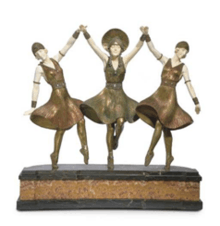
At the beginning of the 2000s the collection of Mkrtich Okroyan had been replenished with art deco home decoration. The collection comprises works of outstanding designers of that time — Jacque-Emil Rulmana, Jules Lelio, Paul Follo, Lui Xiu and André Mar. Taste to simple and pure forms, esthetic refinement, expensive and rare materials, impeccable technique are attributes of their works.
Decorative panels occupy one of the central stages among the permanent exhibition of the museum. There is a panel by the Parisian decorator Pierre Bobo which was specially created for Roseland ballroom in New York. Also, the decorative works of the lacquer artist Jean Dunand who participated in decorating the interiors of the ocean liner Normandy are presented.
The creative works of Edgar Brandt the leading ornamental blacksmith of Art Deco era is also widely presented in the collection of the museum. The halls are illuminated with the authentic lamps made by Brandt, Paul Quiss, Albert Cheuret.
Furniture art nouveau

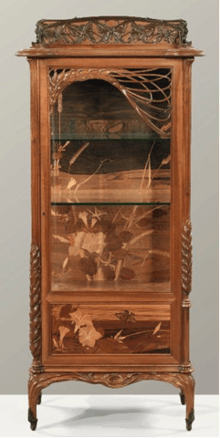
The works of French art nouveau masters: Émile Gallé and Louis Majorelle, sets of furniture for the living rooms of the Swiss sculptor Charles Albert Angst and House Dio are represented in one of the halls of the museum. Émile Gallé and Louis Majorelle the representatives of Nancy School are the leading masters of art nouveau furniture. The peculiarity of their works is characterized by adding natural details representing plants and animals and the marquetry technique. The collection also includes works of the famous Czech drawing-artist Alphons Mucha and decorative ironwork of the architect Hector Guimard. Both artists have played a significant role in shaping the stylistic features of art nouveau.
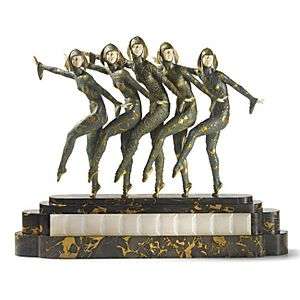
Scientific research and exhibition activities
A vigorous scientific research is permanently conducted under the Art Deco ambitious project. "Images of art deco" (Art Deco Gallery, Moscow, 2010). The project was devoted to works of the Russian artists of the first quarter of the 20th century working in the Art Deco style and who were closely connected with art life of Western Europe. The series of lectures named as "A barbarity inoculation: from the Russian ballets to Decorated style" took place within the exhibition. "Erté and the golden 20s" (Art Deco Gallery, Moscow, 2011–2012). The works of a past master of the Hollywood chic Romain de Tirtoff known to the world under a pen name Erté was presented at the exhibition. One may definitely call his creative masterpieces a reference embodiment of the Art Deco style His decorative sculpture and graphic works were added with home decoration and design of the 20th century.
"The Sergey Dyagilev's "Russian Seasons" and its impact on the Art Deco style" (The Art Nouveau and Art Deco museum, Salamanca 2011). The Project was organized by the Art Nouveau and Art Deco museum and showroom of Salamanca University with the assistance of the Manuel Ramos's as part of the Year of the cultural cooperation between Russia and Spain. The unique graphic works and suits created by the Russian masters for the Dyagilev’s ballet company performances were presented at the exhibition, as well as the decorative sculpture made of bronze and ivory within the collection of Mkrtich Okroyan.
"Körperkultur. The Body culture in Germany and the USSR, 1910 — the 1930s" (Art Deco Gallery, Moscow, 2012 — 2013). The project was run within the Year of Germany in Russia. The exhibition comprised the Nikolay Zagrekov’s masterpieces, as well as pieces of the documentary photography taken from the German magazines and books which revealed the beauty of the human body, some rare photos of Meyerhold's biomechanics taken from the Bakhrushin Theatre Museum collection alongside with the sculptures from the personal Mkrtich Okroyan’s collection.
References
- "An Art Deco Paradise in Moscow's New Museum". The Moscow Times. 20 August 2015. Retrieved 29 February 2016.
